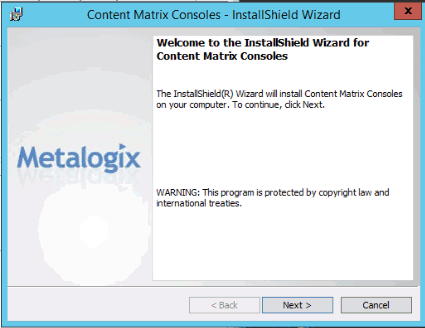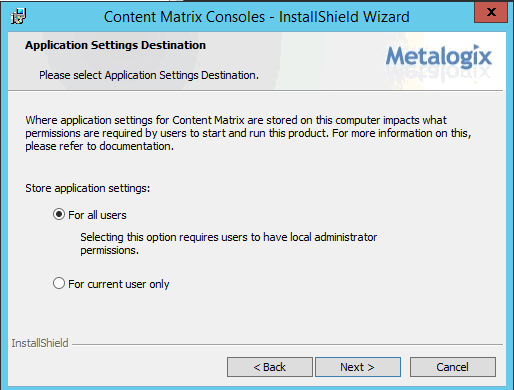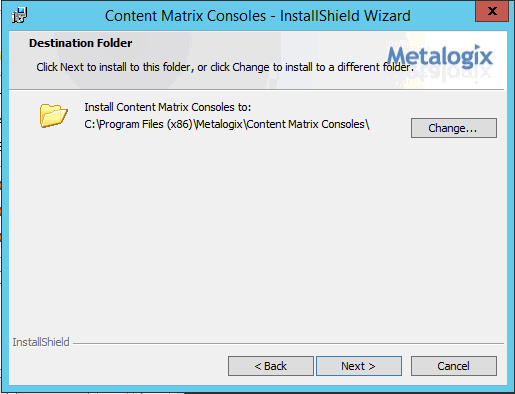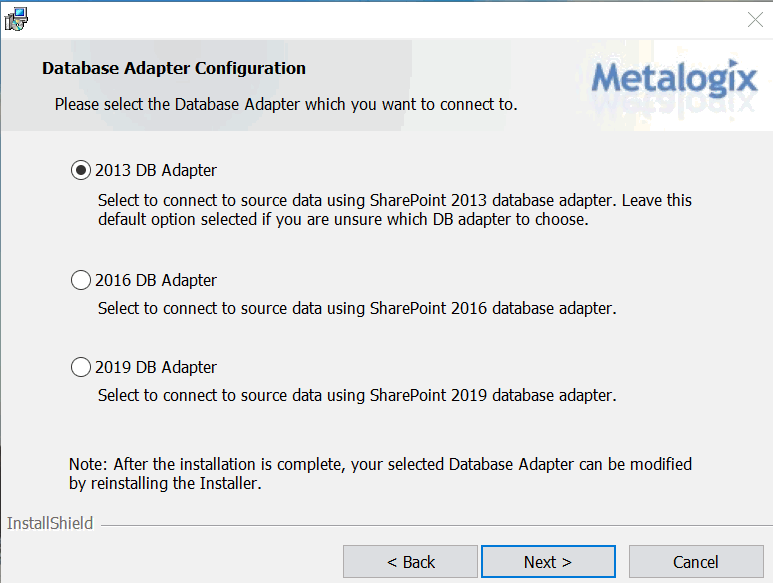Installing the Metalogix Content Matrix Consoles
This section describes the installation steps for the Metalogix Content Matrix Consoles.
NOTE: Consoles for all editions of Content Matrix will automatically be installed. However, you will only be able to use the Consoles that are covered by your license.
Metalogix Content Matrix Consoles can be installed on any computer that meets the minimum hardware and software requirements for each component that is installed, provided that the computer also has access to the source and target environments (for connection purposes). For an on premises installation, the machine must have access to the SharePoint environments but does not require that SharePoint is installed on it directly, and it does not have to be a WFE.
Before running an installation of the Metalogix Content Matrix Consoles, please see Basic Installation Scenarios to better determine what installation scenario works best for you. This will help you determine the best location for you to install the Metalogix Content Matrix Console(s).
NOTE: You can also install the Metalogix Content Matrix Consoles silently, using Command Prompt.
To install the Metalogix Content Matrix Consoles:
1.Copy the Metalogix Content Matrix Consoles.exe file to the machine on which you want to install.
2.Close all open applications, including your browser.
3.Double-click Metalogix Content Matrix Consoles.exe to start the installation process.
NOTE: Because this installer requires an elevated set of permissions to run, if you do not have the required permissions a message will open informing you that elevated permissions are required. To run the installer with these elevated permissions, select the installer file, right-click and select the Run as administrator option.
4.Click [Next].
5.Read and accept the License Agreement terms then click [Next].
6.Use the information in the following table to determine the appropriate Application Settings Destination option to select.
|
If you want to ... |
Select ... |
|---|---|
|
require all users of the machine to be a local administrator in order to run Content Matrix Console |
For All Users. NOTE: If you select this option: ·program data will be stored in AND ·only the first user who launches Content Matrix for the first time will be required to enter a license key. |
|
allow all users of the machine to run Content Matrix Console without being a local administrator |
For current user only. NOTE: If you select this option, when each user launches Content Matrix for the first time: ·program data will be stored in AND ·each user be required to enter a license key. * If you are upgrading from a version earlier than 9.3 and select this option, program data will automatically be copied from C:\ProgramData\Metalogix to the new file location. |
7.Click [Next].
By default the installation Wizard will install all of the selected Metalogix Content Matrix client applications under C:\Program Files (x86)\Metalogix.
You can, however, click [Change] and select a different directory.
8.Click [Next].
NOTE: If you have chosen to install Content Matrix SharePoint Edition on a machine that does not also have SharePoint installed, you will be prompted to select a Database Adapter Configuration for either SharePoint 2013, 2016, or 2019. (Note that more than one adapter cannot be installed on the same machine at the same time. If you need to switch from one to the other at a later time, uninstall then re-install the SharePoint Edition using the Modify operation.)
9.Click [Install].
The installation process will run, and Editions of Metalogix Content Matrix Console will be installed.
10.Click Quit to exit the Installation Wizard.
Installing Content Matrix Consoles Silently
As an alternative to installing Metalogix Content Matrix Consoles via the UI, you can use Command Prompt to install them silently.
NOTE: The basic command uses the following installation default options:
·For all users (meaning that the user must be a local administrator for the machine where the Consoles are installed
AND
·If SharePoint Edition is being installed on a client machine, the SharePoint 2013 DB adapter.
To install Content Matrix Consoles silently using default options:
1.Open a Command Prompt as an Administrator.
2.Switch to the directory where the file Metalogix Content Matrix Consoles.exe is located.
3.Type "Metalogix Content Matrix Consoles.exe" /S /v/qn and press <Enter>.
Additional Parameters for Changing Default Options
The table below identifies additional parameters that allow you to change the user setting and/or SharePoint DB adapter version.
|
If you want to ... |
Then add the following parameter... |
|---|---|
|
change the user setting to For current user only (meaning all users of the machine to run Content Matrix Consoles without being a local administrator |
/v"ISUNDERCURRENTUSER=1"
EXAMPLE: "Metalogix Content Matrix Consoles.exe" /S /v/qn /v"ISUNDERCURRENTUSER=1" |
|
specify the SharePoint DB adapter version to use when installing on a client machine |
/v"SELECTED_DBVERSION=<value>"
NOTE: Valid values are SP2013, SP2016 and SP2019. EXAMPLE: "Metalogix Content Matrix Consoles.exe" /S /v/qn /v"SELECTED_DBVERSION=SP2016" |
Installing and Configuring the Content Matrix SharePoint WSPs
This section will walk you through the process of installing the server components (Metalogix Content Matrix SharePoint WSPs) on a target on premises SharePoint farm.
When installing the Metalogix Content Matrix WSPs you should note that an IIS Reset will need to be performed when the solution (WSP) file is deployed through the SharePoint farm. This is a requirement of SharePoint, and not of Quest. In most cases this IIS Reset is automatically done as part of the solution deployment. For more general information on this issue, please see the following MicrosoftTechNet article: http://technet.microsoft.com/en-ca/library/cc2v=office.14).aspx#DeployFarmSolutions.
There are a number of methods that can be used to try and mitigate any downtime when deploying a SharePoint farm solution. One of these methods is to schedule the solution deployment for a time period that will have low impact to the environment's users.
Special Note About Metalogix License Check
Prior to version 8.8, it was a licensing requirement that you install Metalogix Content Matrix Organizer or License Check to support writing content to an on premises SharePoint farm. As of version 9.0, the Organizer option is no longer available, and you will be required to install License Check only if you have a Content Under Management (CUM)-type license (beginning with the digits 823) that was issued prior to version 8.8. The License Check installer (Metalogix License Check.exe) is available in the installation zip file.
The Metalogix Extensions Web Service
The Metalogix SharePoint Extensions Web Service enables both Read and Write access to remote SharePoint instances. This remote connection accesses the content through the remote SharePoint installations Object Model (OM). The Extensions Web Service can be installed using the same Metalogix Content Matrix Setup.exe file that installs the client application, allowing it to be installed on SharePoint source environments as well, when migrating with Metalogix Content Matrix Console SharePoint Edition.
Once the Extensions Web Service is installed on one SharePoint Web Front End (WFE) it will automatically be pushed to any other SharePoint WFEs on the farm as a SharePoint solution file (WSP). When the Web Service has been deployed it can be managed as a SharePoint web solution, and can be accessed through the farms Central Administration page, to administer, disable, or uninstall the Web Service.
The Extensions Web Service component can be installed on any SharePoint 2007 (MOSS 2007, WSS 3.0), SharePoint 2010 (Foundation or Server), SharePoint 2013 (Foundation or Server), SharePoint 2016, or SharePoint 2019 environment, and is supported on both 32-bit and 64-bit servers.
The Extensions Web Service helps to enable some migrations features through the remote access to the SharePoint OM, so it is recommended to have them deployed if possible.
After installation, the Web Service will run under the app pool user account. This means that any user running a migration with Metalogix Content Matrix will only need to have general access to the content that is being migrated, in the SharePoint UI.




